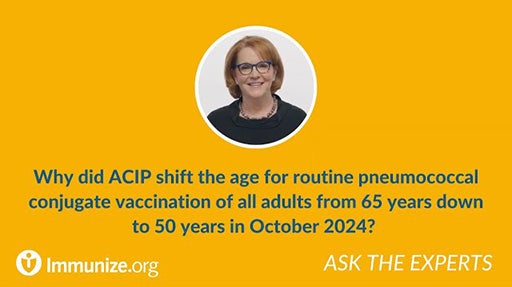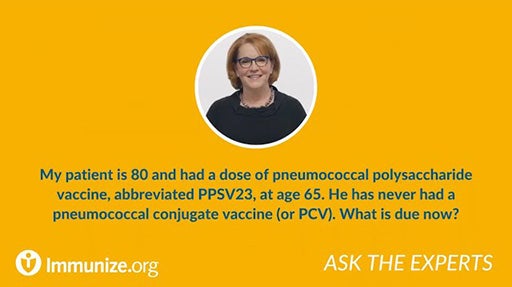ACIP has made a series of changes in its recommendations for pneumococcal vaccination of adults since 2022 in response to the licensure of new pneumococcal conjugate vaccines (PCVs). In January 2022, CDC published recommendations for PCV15 (Vaxneuvance, Merck) and PCV20 (Prevnar 20, Pfizer) as pneumococcal vaccination options for all adults age 65 and older and for adults age 19 through 64 with certain medical conditions or other risk factors for pneumococcal disease. ACIP stopped recommending PCV13 (Prevnar 13, Pfizer) for adults; however, CDC clinical guidance allows for its use in rare circumstances if only PCV13 is accessible and the patient would otherwise be unvaccinated. When PCV15 is used routinely, it should be used in series with 23-valent pneumococcal polysaccharide vaccine (PPSV23, Pneumovax, Merck) given one year later.
In June 2024, ACIP recommended PCV21 (Capvaxive, Merck) as an option in all situations where PCV is recommended for adults. As with PCV20, PPSV23 is not recommended following PCV21.
In October 2024, ACIP recommended that routine immunization of all adults with a PCV begin at age 50 years, rather than age 65 years. This change was made to address the substantial amount of preventable invasive pneumococcal disease (IPD) among adults age 50 through 64.
Adults 19 through 49 years eligible for pneumococcal vaccination as a result of a high-risk condition who have no or unknown history of PCV should receive one dose of PCV20 or PCV21 alone, or a dose of PCV15 followed by a dose of PPSV23 one year later (with a minimum interval option of 8 weeks for people with an immunocompromising condition, cochlear implant, or cerebrospinal fluid leak).
The current CDC guidance for the use of pneumococcal vaccines in adults are outlined in this job aid from CDC: www.cdc.gov/pneumococcal/downloads/Vaccine-Timing-Adults-JobAid.pdf.
Immunize.org has standing orders for pneumococcal vaccination of adults for all PCV options and PPSV23 (if indicated) at: www.immunize.org/catg.d/p3075.pdf.




